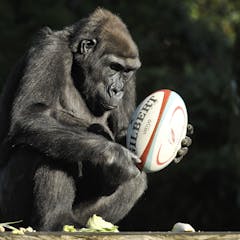
Articles on Animal behaviour
Displaying 161 - 180 of 197 articles

Most of us have experienced the overwhelming urge to yawn in response to another person yawning – but we’re not the only species to do this. Research published in PeerJ today shows bonobos – our closest…

Many of us know from personal experience that raising children can be stressful, but a new study reveals that stress can be enough to affect the quality of parenting – in mongooses, at least. A recent…

Editor’s note: the research paper on which this article is based has been retracted by the journal. Stegodyphus dumicola is a social spider. This curious little creature lives in shared nests with more…

The recent public exhibition of portraits painted by George W Bush, retired President of the United States, has managed to throw a lot of people into a tizzy. Critiques of his work ranged from relatively…

Visual illusions, such as the rabbit-duck (shown above) and café wall (shown below) are fascinating because they remind us of the discrepancy between perception and reality. But our knowledge of such illusions…

Fossils can tell us lots about animals – their size, age or sex, which is mostly physical characteristics. Evidence about how they may have behaved is rare. But the 240m-year-old fossil dung that I found…

Ants have been quite successful, evolutionarily speaking. They are found on every continent, apart from Antarctica. They fill a range of ecological niches, from the tops of towering rain forest trees to…

Humans have been fascinated by the colour-changing abilities of chameleons for a long time. Aristotle himself, the forefather of Western philosophy and also a keen zoologist, mentioned the lizard’s ability…

Hornets put fear into the minds of most, but there is a parasite that the hornets fear (if indeed they are capable of fear). Sphaerularia vespae is a parasitic nematode that infects the Japanese yellow…

Reintroduction programs are key initiatives for re-establishing or re-stocking animal populations, and while some are successful, many, unfortunately, are not. Endangered and critically endangered animals…
A new species of sea slug has been found to inject its sexual partners with secretions that alter their behaviour. The sea…

Everyone knows what it’s like to be uncertain – at least, humans do. But are non-human animals ever uncertain? When we feel uncertainty, instead of risking the consequences of a bad or wrong decision…

In the field of animal behaviour, there is one topic that is almost guaranteed to get your study in the popular press: showing how an animal behaves just like humans. This can be solving problems, using…

Teaching a robot to walk – even poorly – requires huge investment into computational resources. How is it that even the simplest animals are able to achieve far more sophisticated feats of manoeuvrability…

As humans, we point all the time. It’s an action we do almost without thinking: even one-year-old infants use pointing and understand what pointing means when an adult does it for them. It’s a really simple…
Shy birds stick together in flocks while their bold counterparts have more social partners, according to research from Oxford…

As humans, we experience an amazing world of colour, but what can other animals see? Some see much more than us, but how they use this vision is largely unknown. We see what we see because our eyes have…

September is the peak of Australia’s own version of “home-grown terrorism” (as memorably described to me by a distraught and bleeding school principal, valiantly attempting to protect his pupils), when…

For life to persist, it must tolerate its environment. The depth of an arctic winter is formidable, and is most notably overcome by hibernation. But some reptiles and amphibians survive by allowing their…

In our society, not many people are lucky enough to have an ideal boss who they would want to follow faithfully for the rest of their lives. Many might even find their boss selfish and arrogant or complain…
